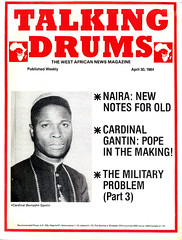Markets Around Africa
New Notes Replace Old Naira
Details of the measures announced in a special broadcast by Brigadier Idiagbon, Chief of Staff, Supreme Headquarters are reproduced below.
***
Since Wednesday, April 25th, 1984, the existing Nigerian currency note of the 20 naira, 10 naira, five naira and one naira denominations is being withdrawn from circulation by the Central Bank of Nigeria and new notes in these denominations will be issued in exchange.
All Nigerian borders have been closed except in respect of persons travelling by air or sea. Armed and security forces have been ordered to deal ruthlessly with any person attempting to violate our borders while the closure lasts and the currency exchange exercise is being undertaken.
Any persons caught trying in any way whatsoever to sabotage this currency exchange exercise will be arraigned before the anti-sabotage tribunal.
The exchange which commenced at commercial banks and at Central Bank branches at 0800 local time on Wednesday April 25th, 1984 will be completed at 1800 on Sunday May 6th, 1984. Individuals can exchange up to a maximum of 5,000 naira over the counter. Any amount in excess of 5,000 naira will have to be deposited with a bank which will issue the depositor with the proper acknowledgement to that effect.
Every depositor with an amount exceeding 5,000 naira who does not have Nigeria a bank account is required to produce to the bank at the time of lodgement an affidavit sworn to in the high court indicating the source of the lodgement and that the amount involved belongs to him or her, together with three passport photographs, one of which will be returned to him or her duly stamped by the bank.
Account holders will make direct payment into their accounts at the banks in the normal way, except that if the direct payment exceeds 5,000 naira, they must produce an affidavit and three passport photographs.
The old currency notes of 20 naira, 10 naira, five naira and one naira will continue to be legal tender up to the completion of the currency exchange exercise on Sunday May 6th, 1984.
In rural areas, where no banking facilities exist, the sole administrators of local governments will collect money for exchange from individuals and arrange to exchange it at the nearest branch of the Central Bank of Nigeria. The administrators will issue receipts to the individuals from whom he has received money. The receipts will be recovered from the individual after the money is given to him or her in exchange. The sole administrator will, for the purpose of security, carry out this exercise under the supervision of the members of the armed forces, the police and other security agents.
All persons, without exception, arriving at the air and seaports during this period will be subjected to a thorough search. Seven jailed over fake notes Three Nigerian businessmen and four Chinese have been jailed in Taiwan for printing N20 notes, a police spokesman told the News Agency of Nigeria (NAN) in Lagos.
The spokesman, Mr Chris Ogbuji of the Force C.I.D. Alagbon Close said that at the time the Nigerian business man and their Chinese collaborators were arrested, they had N400,000 in N20 denomination already printed and packed in preparation for shipment to Nigeria.
The businessmen and their Chinese collaborators were apprehended in Taipei on September 5th, 1983. Naira printed outside Nigeria Naira notes were being printed in some neighbouring countries, police alerted in Lagos last week.
The existence of an illegal minting factory for the printing of naira notes followed the arrest of a man whom police described as "an ECOWAS national." The police said the suspect was arrested at some border near Badagry. According to the police, N4,000 fake notes were recovered from the suspect as he attempted to smuggle them into the country.
The fake notes, all in N20 denominations, bore the same serial number of C/2 268842.
Oil supplies from Nigeria A ship carrying crude oil has docked at Tema to discharge 40,000 tonnes of crude oil. The oil is worth 10,000,000 dollars. A ship carrying a similar consignment is expected soon.
The Secretary for Fuel and Power, Mr Appiah Korang, told the GBC that arrangements with the Nigerian National Petroleum Corporation have been completed and it is hoped that the fuel situation will soon be normalised. Under the new agreement, Ghana will be supplied fuel under irrevocably confirmed letters of credit from a first class bank in Europe.
That is, any crude oil being lifted from Nigeria must be guaranteed by a European bank. The supply of fuel will, therefore, depend on how often Ghana honours her part of the agreement.
The Fuel and Power Secretary, however, assured the public that his Ministry, in conjunction with the Ministry of Finance and Economic Planning and the Bank of Ghana, will work hard to maintain the security required so as to ensure regular supply of fuel and to minimise the queues at filling stations.
